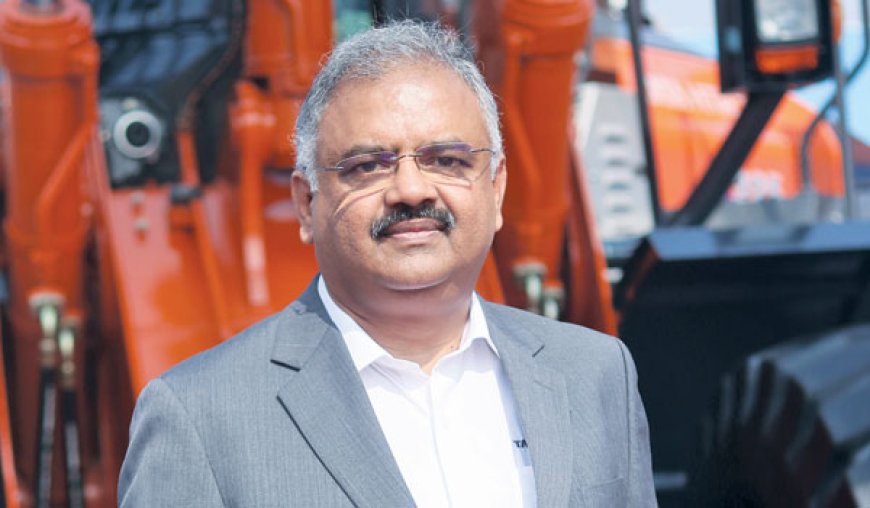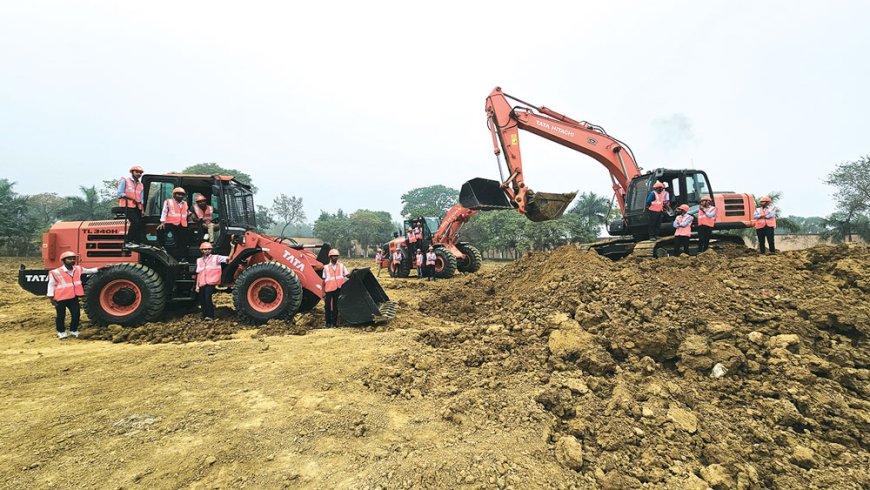From a productivity standpoint, skilled workers are essential for operating equipment efficiently and safely.

As India strives to emerge as a global leader in construction equipment manufacturing, what are your perspectives on the challenges and bottlenecks within the sector?
India has risen to become the world’s third-largest construction equipment manufacturer, trailing only behind China and the USA. Despite significant improvements in recent years, challenges persist, particularly in the realm of exports. Challenges such as logistical costs, the expense of raw materials, and the quality and cost of power supply remain significant gaps. These deficiencies can disrupt the movement of raw materials and finished products, leading to increased production costs and delays.
The availability of a skilled workforce remains a challenge, particularly in specialized areas such as advanced engineering and technology. Bridging the skills gap through comprehensive training and education programs is essential to meet the industry’s evolving demands. Furthermore, addressing import dependency for hydraulic pumps and motors is an important aspect to consider, as these components are critical for machine pricing. Another point is access to affordable financing options for customers is critical for manufacturers, especially small and medium-sized enterprises (SMEs). Enhancing access to credit and implementing supportive financing schemes can facilitate industry growth and expansion.
Addressing these challenges requires concerted efforts from industry stakeholders, policymakers, and other relevant entities. By addressing these bottlenecks, India can unlock its potential as a global leader in construction equipment manufacturing and contribute significantly to economic growth and development.

How has the shortage of skilled labour impacted the construction equipment industry? What initiatives has your company taken to address the skills gap among your workforce?
Construction projects require various skilled workers, including equipment operators, technicians, and engineers. The shortage of skilled labour directly impacts the project timelines, further resulting into a direct impact on the ROI. Since, operator’s skill level is directly co-related with the machine’s utilization / downtime / wear and tear and project cost.
From a productivity standpoint, skilled workers are essential for operating construction equipment efficiently and safely. When there is a shortage of skilled labour, productivity levels may decline as less-experienced workers may take longer to complete tasks or may not perform as effectively. This can lead to inefficiencies and lower productivity.
Overall, the shortage of skilled labour poses significant challenges to the construction equipment industry, impacting project timelines, costs, productivity, safety, and growth prospects.
In order to resolve the shortage of skilled labour issue, Tata Hitachi is committed to skill development and employability, Tata Hitachi’s skill development program encompasses training for unemployed youth, non-certified operators, dealer staff, and own staff.
The organisation has a two-pronged approach:
For permanent employees and contractual staff: On-the-job training in different competencies like welding, fitting, machining, painting, and mechanical and electrical maintenance
Theoretical training and training setups for different skills.
Training imparted through the Skill Training Centre inside the plant, which has world-class facilities and Hitachi-certified trainers.
Training for youth from local communities: We have Operator training centres at Dharwad and Kharagpur with facilities for training on operating Construction Equipment like Hydraulic Excavators, Backhoe Loaders, and Wheel loaders. This setup is elaborate, with experienced trainers from across the country imparting training. These programmes are accredited with IESC, to ensure the availability of trained operators for customers.
This is backed up by a State-of-the-art simulator for machine operation conditions simulation, which gives near-real-life machine operating experience for the trainees. Once the course is completed, the participants are given certificates in collaboration with the GOI, which help them get a job as Machine Operators easily across the country. We also provide training at mining job sites to train customer’s operators and mechanics.
How do you look at standardized certification process for construction equipment operators benefitting the industry?
Standardized certification ensures that operators are adequately trained and qualified to operate heavy machinery safely. This reduces the risk of accidents, injuries, and fatalities on construction sites, promoting a safer working environment for all workers. Certified operators possess the necessary skills and knowledge to operate equipment efficiently, leading to increased productivity and project efficiency. They can perform tasks more effectively, minimize downtime, and optimize equipment usage, ultimately improving project timelines and costs.
Also, by establishing a uniform standard for operator training and competency assessment will help in consistency in operator skills and performance across different projects and companies, enhancing overall quality and reliability in construction operations.
Moreover, many regulatory bodies and industry organizations require certification for construction equipment operators as part of their safety and compliance standards. Implementing a standardized certification process ensures that companies and operators meet these regulatory requirements, reducing the risk of legal liabilities and improve project efficiency.
Lastly, certification programs often include ongoing training and skill development opportunities for operators, enabling them to stay updated on the latest equipment technologies, safety protocols, and industry best practices, enhancing their professional growth and career advancement prospects.
Overall, a standardized certification process for construction equipment operators is essential for promoting safety, efficiency, quality, and professionalism in the industry.








